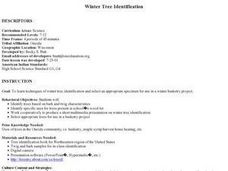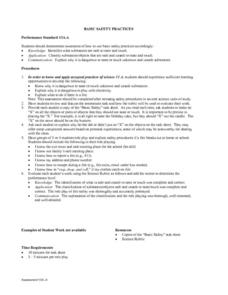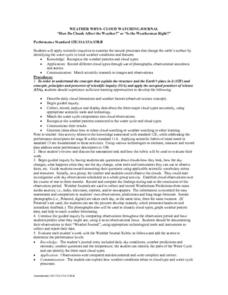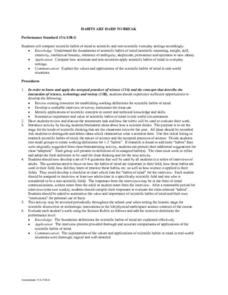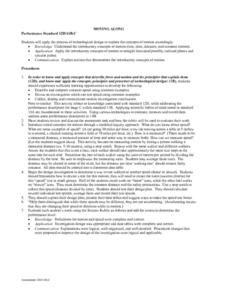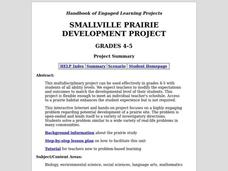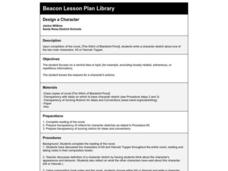Curated OER
Seasons
Students explore the four seasons. In this seasons lesson, students create a class tree. Students make leaves for the tree for each of the seasons. Students mark their paper into fourths and draw a picture of the seasons.
Curated OER
Classifying Living and Non-Living Objects
Students investigate living organisms and define the properties of a living species. For this life characteristic lesson, students examine plants in their class and discuss whether or not they are alive. Students create a...
Curated OER
Winter Tree Identification
Young scholars utilize techniques of winter tree identification such as twig and bark characteristics. Students also identify specific uses for trees in school surrounding. They work cooperatively to produce a multimedia presentation...
Curated OER
Is It Breathable?
Young scholars explore air quality. In this environmental lesson, students observe a simulation of air pollution by blowing into a jar (with a straw) that has chalk dust. Young scholars discuss how air quality can effect the way we breathe.
Curated OER
Mass/Acceleration
Sixth graders examine the relationship between mass and acceleration of an object. In this mass lesson students work in groups and complete a lab.
Curated OER
How We Impact the Earth
Young scholars work in cooperative learning groups to create PowerPoint or KeyNote presentations on how humans impact the earth. This lesson can be accomplished in three different parts.
Curated OER
Choices Affect the Environment-I Make a Difference
Learners examine and research how personal and societal choices can affect the environment. Student find resources that provide scientific research about the possible impact of each of the choices. Students then create a four-panel...
Curated OER
Basic Safety Practices
Students demonstrate an awareness of how to use basic safety practices accordingly. They classify substances that are safe and unsafe to taste and touch. In groups the students explore different substances and explain how they are safe...
Curated OER
Weather Whys- Cloud Watching Journal
Pupils examine how natural processes change the earth by identifying their local water cycle. Individual students complete a cloud journal over a specific period of time. They observe clouds daily and take photographs of the clouds...
Curated OER
Moon Journal
Students review the planets and major moons in the Solar System. In groups, they research and describe the various phases of the moon. They record their observations of the moon phases over a specific period of time and use the...
Curated OER
Habits Are Hard to Break
Studens brainstorm ideas about the ways scientists think. In small groups, studentds create a definition for one or two "habits." Students develop a set of questions to be used by the entire class in a series of interviews. Students...
Curated OER
Making New Electricity
High schoolers investigate the concepts of energy conversion and conservation. They research the history of energy conversions into electrical energy. They design experiments in order to replicate a conversion of energy into electricity.
Curated OER
Weather Where We Are
Students investigate the reports of local weather. They identify types of weather data and correlate it to the conditions. Using the data students draw a picture of the current weather. They conduct the same investigation for all four...
Curated OER
Water, Water Everywhere
Studetns view a terrarium with water droplets on the wals. They discuss the ways the water could have got onto the wall of the terrarium. Learners design an experiment to duplicate the process. They describe the patterns form their data...
Curated OER
Moving Along
Young scholars are introduced to the concept of motion. In groups, they practice calculating the rate, time, and distance of various objects on a variety of surfaces. To end the lesson, they apply the same principles to those objects...
Curated OER
Pendulum Patterns
Students identify the variables involved in the motion of a pendulum. In groups, they research how each different variable is related to the energy the pendulum produces. They share their results with the class and compare them with...
Curated OER
Stellar Spectral Fingerprints
Students listen as the teacher introduces Newton's early discovery of the diffraction of light. They use multiple sources of light (fluorescent, incandescent, sunlight, etc) to bend the light. They first use a prism then a diffraction...
Curated OER
BEWARE OF POISONS
Middle schoolers research and explore all the safety conditions to being exposed to poisons in real-world situations. They review/discuss/investigate about types, sources, effects and responses of poisons by creating general questions to...
Curated OER
Cellular Cellebrities
Sixth graders, in groups, learn the morphology and function of organelles within plant and animal cells.
Curated OER
Smallville Prairie Development Project
Students, through group activities, explain the important scientific, social/historical and aesthetic values of a prairie habitat. They analyze the impact of humans on prairieland and solve a problem regarding potential development of a...
Curated OER
Smallville Prairie Development Project
Students research the characteristics of the prairie habitat focusing on scientific, social/historical and aesthetic values. They investigate how humans impact the prairie habitat while maintaining a daily journal of research and...
Curated OER
Conservation Connection
Students work in groups to create a script for a one minute commercial on how to conserve our reusable energy sources. When the scripts are written, explain to the students that a story board is similar to a cartoon.
Curated OER
Disasters - Where, When, Why
Fourth graders research natural disasters that have occurred in the US in the 20th Century. They create a computer database of the disasters and write a paragraph with the information.
Curated OER
Plant Growth
Students role play as text book creators by designing an animation showing plant growth from seed to maturity. They incorporate things that plants need to grow in the animation.


